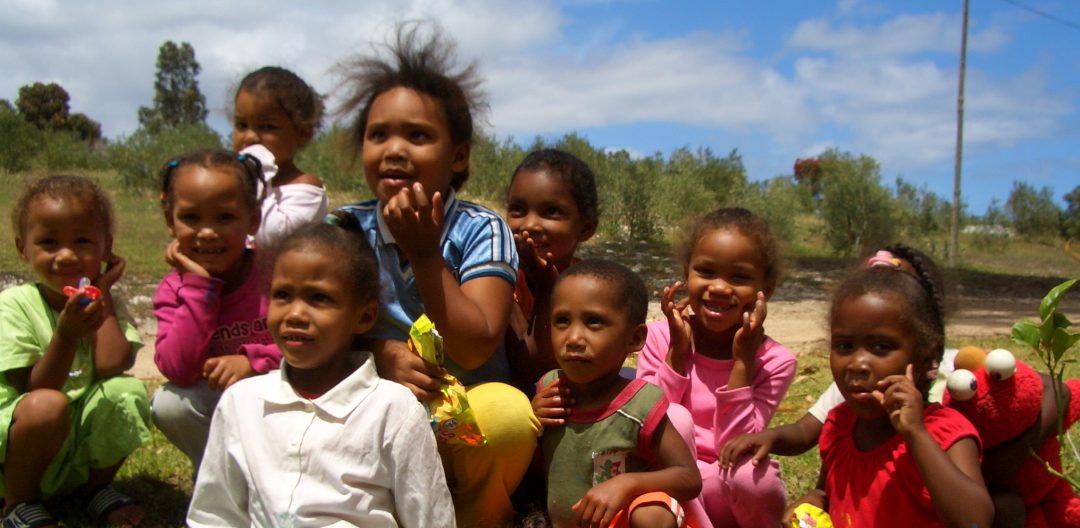Photo: Hamilton Russell Vineyards preschool kids, 2007 (Jacky Blisson)
It is no secret that South Africa has a decidedly chequered past when it comes to human rights. Driving through the vast shanty towns that surround major and even minor cities nation-wide, it is apparent that inequality is still rife today. And yet, as a Canadian descendent of European settlers, it would be hypocritical of me to point fingers. The racial segregation and abuses to which our own indigenous populations have long been subjected are equally disgraceful.
In 2011, Human Right’s Watch published a damning report on the conditions of South African farm workers, with particular emphasis on fruit and wine farms in the Western Cape. Unacceptable living conditions, illegal evictions, alcoholism, dangerous pesticide exposure and obstruction to joining unions were just some of the highlighted concerns. Further fuel was added to the fire last year, when an inflammatory Danish documentary surfaced depicting slavery-like situations on certain estates.
The national, promotional body: Wines of South Africa responded to the ensuing negative press with the following statement: ‘The South African wine industry has come a long way in recent years … to improve the sustainability of one of its biggest assets – the workers. Whilst we recognize that there is still a lot of work to be done, there are numerous programmes that include social upliftment, housing, land reform, education, skills and medical care for farm workers and their families. Thanks to the hard work and dedication of bodies such as WIETA and Fairtrade, there are regular audits across the board… It will take time, but the reality is that change is taking place, even despite many wine farmers running their businesses on very tight margins.’
Chris Mullineux of Mullineux & Leeu Family Wines in the Swartland asserts ‘there is no doubt in my mind that the vast majority of farmers are doing their best to uplift their workers lives and in many cases you can see they visibly are being improved’. And this, despite the many challenges the industry faces. He explains that the South African wine sector, unlike the majority of wine producing countries, does not receive any government subsidies, and is at the mercy of a volatile exchange rate and high rate of inflation. Roughly 50% of South African wine is sold in bulk at very low prices, with the wineries often operating at a loss.
‘There is no doubt in my mind that the vast majority of farmers are doing their best to uplift their workers lives…’
This cycle of unsustainably low purchase prices from major retailers is effectively slowing the pace of progress, according to US-based South African fine wine importer Pascal Schildt. ‘Quality has massively improved over the past decade, but prices have not risen apace. Consumers need to be encouraged to trade up a few dollars, thereby allowing retailers to adjust their buying habits’.
As in most industries, buying the cheapest quality available is (more often than not) tantamount to supporting labour exploitation. A marginal shift upwards can make a huge difference to a wine estate’s ability to adequately compensate workers, with the added bonus of providing significantly more pleasure in the glass.
Just as the conscience minded among us try to buy local and/ or sustainably produced goods, we as wine drinkers can initiate change by supporting South African wine producers that are making the necessary efforts to treat workers fairly. And, despite a murky track record and the obstacles outlined above, significant improvements are to be found on a vast number of wine farms.
‘Quality has massively improved over the past decade, but prices have not risen apace’.
One of the pioneers of this movement is highly respected Elgin estate Paul Cluver. Their Thandi brand of wines was the first agriculturally-based Black Economic Empowerment (BEE) project back in 1995. Thandi Wines went on to become the first Fair Trade certified wine brand in the world, funneling back profits to community upliftment projects like education, healthcare, housing improvements and so forth.
Top ranked Hamilton Russell Vineyards in the Walker Bay runs the Hemel-en-Aarde Valley pre-school on their property, accepting under priveledged children from through out the community, in the hopes that a strong early educational base will set them in good stead to succeed in their future schooling. Countless other such projects exist throughout the Cape winelands. See a list of great initiatives compiled by Wines of South Africa here.
Seeking out wines that hold the Fair Trade or WIETA (Wine and Agricultural Ethical Trade Association) accreditation is an increasingly sound way to ensure the purchase of equitably produced wines. South Africa is currently the largest producer of Fair Trade wine in the world, with over 76 certified farms employing over 3000 workers. Fair Trade products are labelled with a distinctive logo, making them easy to identify. WIETA is another standard bearer, working to ensure that fair wages and acceptable labour conditions are upheld in the South African wine trade. A large number of South African wineries are members (see full list here) and are regularly audited to ensure that they meet the required norms.
South Africa is currently the largest producer of Fair Trade wine in the world.
If there is one thing that struck me during my harvest work and travels through South Africa, it was the ardent desire of wineries to prove themselves on the world stage. On the whole, they are a passionate, enthusiastic community commited to throwing off the shackles of the past. While injustices are still rampant, significant efforts are being made by many wine farms to redress the situation. Our responsability as consumers is to champion the leaders of this movement.

